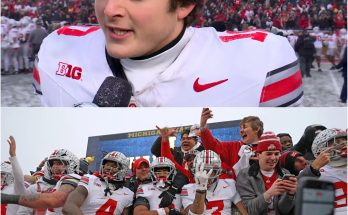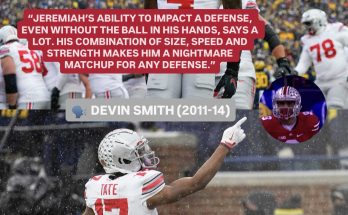Chicago Bears Fans React Harshly to Jonathan Owens: A Look Into the World of Sports Fans and Public Reactions
Chicago, a city renowned for its passionate sports culture, has seen its fair share of intense fan reactions over the years. Whether it’s the Chicago Cubs’ long history of heartbreak and eventual success, the Chicago Bulls’ dominance in the 1990s, or the Chicago Bears’ struggles and triumphs on the gridiron, fans in the Windy City hold their teams to an incredibly high standard. They expect excellence and accountability, especially from players who don the team colors.
In the case of Jonathan Owens, husband of Olympic gold medalist Simone Biles, a man who is far more familiar to the general public for his relationship with the gymnastics legend than his football career, the expectations were somewhat different. Yet, in a surprising twist, Bears fans reportedly gave Owens a harsh dose of “reality,” culminating in a brutal confrontation that brought their emotions and expectations to the forefront.
The Chicago Bears Fanbase: Passion and High Expectations
To understand why Bears fans may have reacted so strongly, it’s essential to consider the history of the franchise and the expectations placed on its players. The Bears are one of the oldest and most storied franchises in the NFL. With a rich history that includes a Super Bowl victory in 1985 and decades of legendary players such as Walter Payton, Dick Butkus, and Mike Ditka, the fanbase has a lot to live up to.
After years of underperformance, fans are desperate for a return to glory. The Bears, while competitive in some years, have struggled to put together a consistent playoff contender in recent seasons. Quarterback woes, defensive inconsistencies, and offensive struggles have kept them from reaching their full potential, and with each season that passes without a championship, the pressure on both the front office and the players only mounts.
Fans are quick to place blame when their team doesn’t meet these expectations, especially in moments of heightened frustration. When the Bears are losing, the tendency for some fans is to turn their anger toward players, coaches, and even individuals associated with the team who are perceived as outsiders, even if their connection to the Bears is tenuous.
Jonathan Owens: The Connection to the Chicago Bears
Jonathan Owens, who made a name for himself as a safety for the Houston Texans, is known primarily for his relationship with Simone Biles, one of the most decorated gymnasts in history. The two became one of the most popular couples in sports, frequently sharing their personal life on social media and in interviews. Owens, though a professional athlete in his own right, is often associated with Biles, which has led to him garnering significant media attention.
However, Owens’ association with the Bears is more indirect. While he was never a marquee player for Chicago, he recently joined the team’s roster, offering a potential boost to the defense. For Bears fans, the bar for roster additions is high. They’re used to big-name signings and players with immediate impact. With Owens coming in as a relatively unproven player, it didn’t take much for some fans to become disillusioned with his presence on the team.
The Harsh Fan Reaction: What Led to the “Get the Fk Out” Comment?**
The dramatic response from some Chicago Bears fans, which reportedly involved telling Owens to “get the f**k out,” was likely the result of multiple contributing factors. These factors, while not all directly related to Owens as a person, can be tied to the frustrations that many fans feel about the state of the Bears’ franchise and the emotional investment they place in their team.
First and foremost, fans often have sky-high expectations when it comes to new players, especially those joining a team in need of a turnaround. The Bears have struggled to find consistent leadership and talent at key positions, and every new acquisition is scrutinized under a microscope. When a player is perceived as not immediately fulfilling those expectations—whether through lack of playing time, underperformance, or perceived lack of impact—it can lead to a swift and brutal response from the fanbase.
In Owens’ case, his status as Simone Biles’ husband may have added to the pressure. While his connection to Biles is certainly a source of admiration for some, it also opened Owens up to greater scrutiny. Fans may have seen him as riding on the coattails of his famous wife rather than earning his place based on merit. In an environment like professional sports, where every player is expected to prove their worth on the field, it can be difficult for someone with a high-profile personal life to avoid criticism.
Additionally, fans are often frustrated with the broader issues surrounding their team. For the Bears, the long-standing quarterback struggles, inconsistent coaching changes, and lack of championship contention have left fans restless. As the franchise navigates yet another rebuilding period, it’s easy for their anger to be misdirected toward players or figures they see as symbols of the team’s failures. Owens, being a recent addition and not a headline-making signing, could have become an easy target for these emotions.
The Digital Age: The Amplification of Fan Discontent
The advent of social media has changed the way fans interact with athletes. In the past, a disgruntled fan might have shouted at a television screen or muttered frustrations to friends in a bar. But today, fans have access to the athletes themselves through Twitter, Instagram, and other platforms. These outlets allow fans to express their discontent directly to players, making it easier for emotions to boil over.
This direct connection between fans and players has led to an increase in harsh, sometimes hostile, reactions. Online platforms give fans the ability to voice their frustrations in ways that feel more immediate, personal, and unfiltered. Owens, being a public figure tied to a high-profile marriage, likely became the target of some of that online venom, particularly when his performance—or perceived lack thereof—did not meet expectations.
The result of this growing dissatisfaction was a seemingly brutal and unwarranted comment from fans telling Owens to “get the f**k out.” This interaction is just one example of how volatile sports fandom can become, especially when a team is not living up to its potential.
The Role of Jonathan Owens: Evaluating the Bigger Picture
While harsh reactions like those directed at Owens are never justified, they do raise an important point about expectations and accountability in the world of professional sports. Owens, like any player on the field, is expected to perform to the best of his abilities. Yet, it’s essential to recognize that a fanbase’s reaction often says more about the frustrations of the entire team and the organization rather than any one player.
Owens is still relatively early in his career with the Chicago Bears. While he may not yet be the game-changing player that some fans expect him to be, it’s also important to remember that every player’s development is unique. He may have joined the Bears at a time when the team is going through a period of flux, and it’s unrealistic to expect instant stardom or immediate results from every player.
The Broader Implication for Athlete Mental Health
Reactions like the one Owens experienced are a reminder of the sometimes-toxic relationship between athletes and fans. In an age where players are constantly under scrutiny, it’s easy to forget that they are human beings with emotions, families, and lives outside of their performances. The pressure of social media, fan expectations, and public opinion can be overwhelming, and athletes like Owens must navigate this difficult terrain while maintaining their mental and emotional well-being.
The brutal comments directed at Owens also highlight the need for greater awareness and empathy in the world of sports fandom. While fans have every right to voice their opinions and frustrations, it’s crucial to remember that athletes are doing their best in a highly competitive environment. Treating players with respect and understanding, even when they fall short of expectations, can go a long way toward fostering a healthier and more supportive sports culture.
Conclusion
Jonathan Owens’ harsh treatment by some Chicago Bears fans may be a reflection of the broader discontent that exists within the fanbase regarding the team’s struggles and their high expectations for success. While the reaction may have been extreme and unwarranted, it underscores the intensity of the connection fans have to their teams and the pressure that athletes face in the public eye. As Owens continues his journey with the Bears, it’s essential to keep in mind the importance of both accountability and empathy, ensuring that players are given the support they need to succeed both on and off the field.



